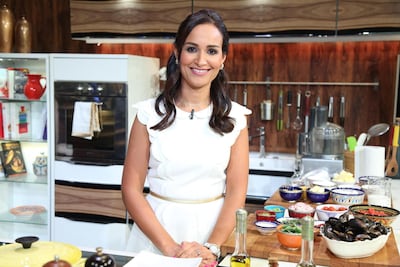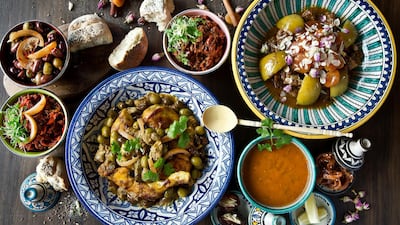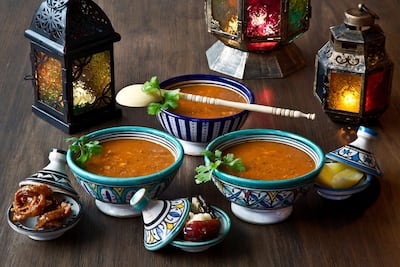Straddling the north-west coast of Africa, Morocco is a country steeped in history. Having found itself, over the millennia, being subjected to rule by the Romans, French and Spanish, as well as the Umayyad Caliphate, it's hardly surprising that its architecture, languages and cuisine are all remarkably diverse. But for chef Hanane Ouaddahou, the UAE has always fallen short when it comes to Moroccan food, and she's trying to do something about that. She's a busy woman, to put it mildly – the working mother of two has lived in Dubai for five years and has emerged as one of the region's most popular television chefs.
Following her dream
“I left Morocco when I was 17,” she recalls. “I was born and raised in Casablanca, my father is from the region of Marrakesh and my mother’s home was Fes. I was taught at a French school and went to live and study in Paris at a business school, where I specialised in auditing and cost controlling. Following that, I worked as a business intelligence consultant for nearly seven years.”
For the uninitiated, business intelligence is all about the best use of information systems for large corporations. Ouaddahou worked with some of France’s biggest names, but her heart always lay somewhere else entirely: cooking.
“My dream was always to open my own restaurant,” she says. “As a young girl I was always in the kitchen, learning cooking from my mother and my grandma. So one day I just said to my husband: ‘Look, I’m 29, I’m pregnant, I’m fed up, I really don’t like my job.’ And he said: ‘OK, let’s do it’ – so I began searching for a restaurant in Saint-Germain.”

The end result was the opening of La Marocaine (The Moroccan). "My son was 6 months old when I opened it, and it was tough as my husband was always travelling, but it was a very good experience and I ran it for two years. There was one girl with me who was peeling vegetables and stewing things, but I was the manager, the waitress [the hired waiter quit the day before the opening] and chef. I was doing everything."
Her husband, who works in the automotive spare parts industry, secured a job in Dubai, so La Marocaine was sold. “It was the time of the financial crisis,” she sighs, “and I lost a lot of money. Another Moroccan family, who ran other restaurants in the city, bought it and changed the name. It’s still running today.”
A chance encounter
Determined not to go back to the corporate world after relocating to the UAE, she decided to start offering cooking classes at her home in Dubai’s Arabian Ranches. “I used to do catering, too, via my Facebook page and my clients came from many nationalities,” she says. “I was busy cooking for my neighbours all the time, especially those from India. Indian people are very fond of Moroccan food because there are many vegetarian dishes and we use lots of spices.”
While on holiday in Morocco visiting her family, she watched some programmes on Fatafeat, the Middle East’s dedicated television station for all things culinary. “My father jokingly asked why I didn’t make contact with Youssef El Deeb [Fatafeat’s founder],” she recalls. “A few months later I did exactly that, on Facebook. I said I wanted to share my Moroccan kitchen because the cuisine isn’t well known here. All everyone knows about Moroccan food is couscous and tagines.”
It transpired that El Deeb had recently sold the channel and started his own television production company. He suggested that they meet up, which they soon did, and Ouaddahou was put through a screen test. That was good enough to merit a trip to Fes in Morocco to shoot a pilot programme, which was never broadcast because El Deeb shifted jobs once again to a new network, which opened up a new world of opportunity.
“My first experience in front of the camera was during Ramadan and it was [broadcast] live. I loved it. I tried pre-recording shows after that, but discovered I preferred the live ones because, sure, you make mistakes from time to time, but you just joke about it to the viewers, fix it and move on. When you’re recording a show, the crew know they have more time, so it’s take after take after take. Live, you have an hour and that’s it – khalas.”
This new line of work regularly took her to Beirut and Egypt, where she's still live on air every week during the cookery segment of Al Qahera Al Youm, one of Cairo's most famous entertainment shows. "I travel to Cairo every Sunday and do three days on the show a week – Sunday, Monday and Tuesday," she says. "I've taken a break for Ramadan, but it will be back to normal in September."
_______________
Read more:
24 Hours in Casablanca, Morocco
Off the eaten path: 8 immersive food adventures
_______________
Meanwhile, Ouaddahou is busy with a month of themed Ramadan iftars held at Galeries Lafayette Le Gourmet in Dubai’s City Walk district, as well as teaching the art of Moroccan cooking at her My Morocco at Your Table classes, which are conducted each Sunday, between 5pm and iftar.
For Ouaddahou, there's a unique magic to introducing people to the many different cuisines from her home country, and her future plans include a collaboration with a hotel in Fujairah and a book, although she says it will be far from your run-of-the-mill cookery book. "I come up with new recipes all the time for the show, sometimes 10 a week, so I'm not short of content."
After all, there’s much more to Moroccan cooking than couscous and tagines.


